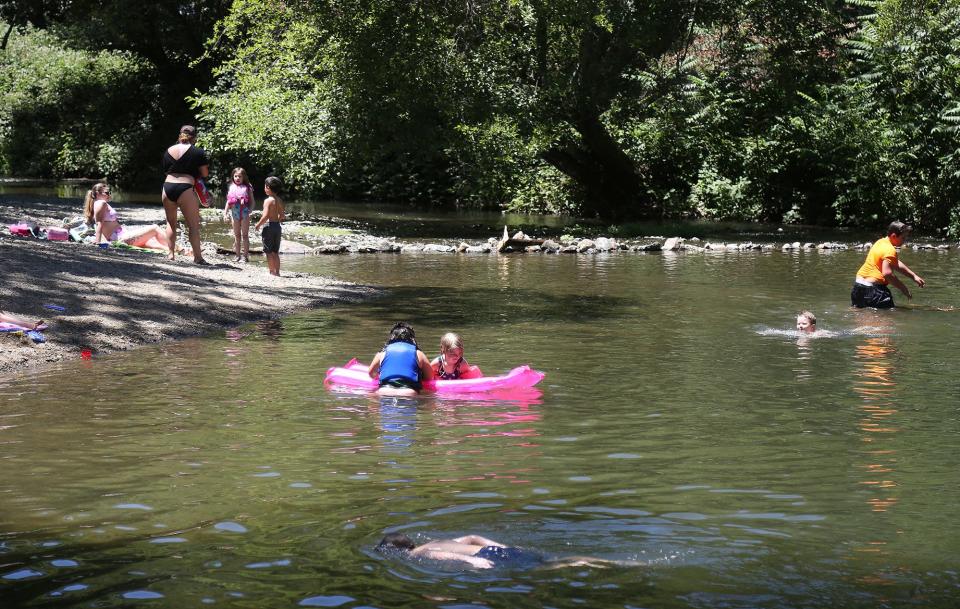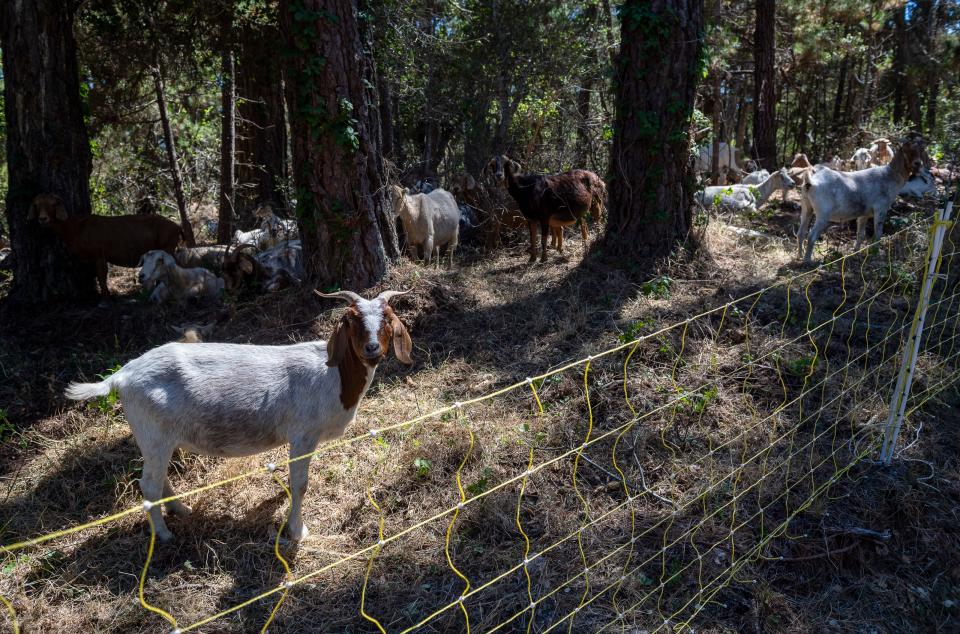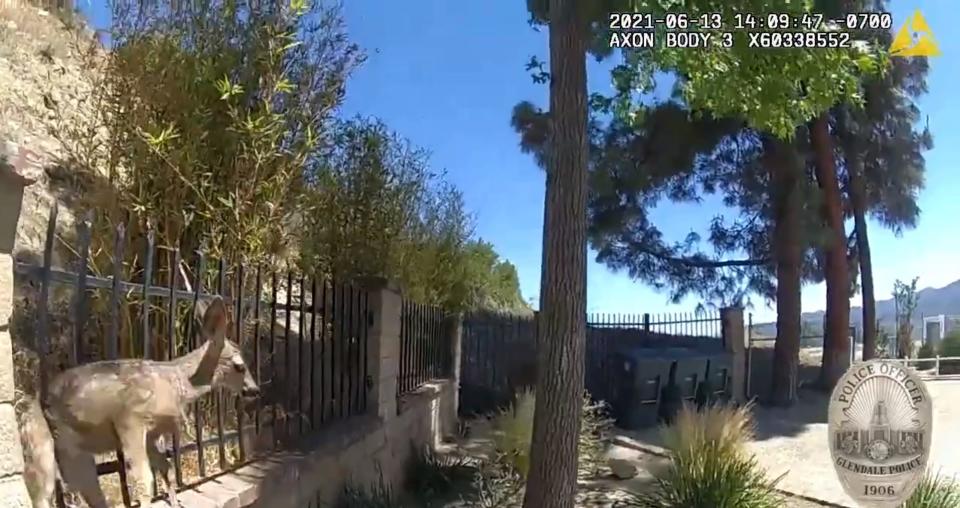In California: Does the Golden State have enough energy to survive this heat wave?
Happy Wednesday! Would you like some news to go with your heat? I'm Winston Gieseke, philanthropy and special sections editor for The Desert Sun in Palm Springs, and I've got the A/C running full blast as I bring you some of today's top headlines.
Have a friend who wants California news delivered to their inbox for free? Let them know they can sign up via this link.
Grid operator: California's energy sufficient amid heat wave — so far

Yesterday, this newsletter reported on Southern California's record-shattering heat. Today, the Associated Press reports that while the state was projected to have enough energy to meet electrical demand Wednesday, residents may be asked to voluntarily conserve electricity later week as super intense heat continues to blanket the West.
The California Independent System Operator (Cal ISO) said the grid was stable and there was no expectation of rotating power outages.
While forecasts also showed enough reserves to cover Thursday evening, a statewide Flex Alert was nonetheless issued for Thursday afternoon, according to NBC 4. This is a request to voluntarily reduce one's power by turning off unnecessary lights, limiting use of major appliances to before 3 p.m. and after 10 p.m., setting air conditioner thermostats to 78 degrees or higher, using fans to stay cool and keeping drapes drawn.
To stay on top of state-issued requests, you can sign up for updates at Cal ISO's notifications page. For local alerts, check your utility's website.
Summerlike heat arrived with spring still on the calendar as a dome of high pressure covered the West. Oppressive daytime highs have been followed by very warm nights.
Palm Springs hit a record 120 degrees on Tuesday, four degrees above the previous June 15 record set in 1961, while Wednesday's high was 113. Meanwhile up north, “dangerously” high temperatures of 110 degrees in some parts of the Bay Area have prompted a heat advisory that remains in effect until 9 p.m. PDT Friday, according to NBC 4.
Looking for ways to combat the heat? If you're up north, The Mercury News has identified nine gorgeous Bay Area beaches you may have never heard of.
Monterey County brings in goats to prevent wildfires

If you found yourself in Jacks Peak Park in Monterey County over the weekend and happened upon 600 grazing goats, you were not dreaming.
The goats are part of a $116,789 wildfire prevention effort funded by a grant from Cal Fire and will be there for roughly three weeks munching on vegetation that can fuel wildfires.
Jacks Peak poses a few challenges to firefighters if a wildfire were to erupt. The 50-year-old, 525-acre park is located on a ridgeline, and over the years there’s been a buildup of vegetation.
The goats were brought in to help expose the heavier, woody vegetation. After the goats clear the vegetation, a tree crew will be brought in to remove additional growth.
“Their voracious appetite and ability to both graze down vegetation and reach low-hanging tree growth make them a helpful and ecologically friendly partner in fire prevention and vegetation clearing efforts,” officials said.
The goats, owned by a company called Goats R Us, are part of a traveling herd originating from Orinda, east of San Francisco. While the goats are in the area, they will be monitored by professional herders using dogs and electric fencing.
Pelicans found mutilated: 'Someone is intentionally breaking' wings, group says

A Southern California wildlife organization is searching for answers after more than 30 pelicans have been attacked and mutilated along the state's coast.
The Wetlands and Wildlife Care Center, a nonprofit group that works with injured wildlife in Orange County, said this week that 32 brown pelicans have been significantly injured between the cities of Huntington Beach and San Clemente since March. Of these, 22 have suffered compound fractures to their wings.
"Someone is intentionally breaking brown pelicans' wings," the organization said in a statement. "We need your help to find whomever is performing this atrocious act."
Debbie McGuire, executive director of Wetlands and Wildlife Care Center, told USA TODAY a $500 reward is being offered in hopes of making an arrest.
The organization is also asking for donations to help pay for surgeries and care for the pelicans. McGuire said that surgery can cost roughly $5,000 and thousands more in rehabilitation.
The brown pelican was once an endangered species in the state in the 1970s, according to the National Park Service. The birds have made a comeback since, but they still remain a protected species in the state.
Meanwhile, back in happy animal news:
Glendale police officer saves deer trapped in fence

A police officer in the Los Angeles County city of Glendale rescued a baby deer that was stuck in a fence, allowing the terrified fawn to quickly rejoin its mother. Head on over to USA Today to see a video of the dramatic rescue.
MacKenzie Scott gives millions to California groups, 'no strings attached'

In non-animal news, MacKenzie Scott, the billionaire philanthropist known for her impromptu multibillion dollar donations to charities and racial equity causes, has announced she's donating $2.7 billion to 286 organizations, including more than three dozen based in California.
The Los Angeles Times reports that this latest round of donations from Scott, 51, who was married to Amazon's founder and CEO Jeff Bezos from 1993 to 2019 and became the third-wealthiest woman in the world upon her divorce, are heavily focused on California community colleges and universities, arts organizations and nonprofits that work for social justice. At least $285 million of Scott’s donations went to 12 of the Golden State's educational institutions.
In a blog post on medium.com, Scott wrote that she wanted to deemphasize “privileged voices” and focus her help on groups that are in the trenches. “People struggling against inequities deserve center stage in stories about change they are creating,” she wrote.
“It’s extraordinary and very different than other billionaires, who tend to give to well-known institutions,” said Stacy Palmer, editor of the Chronicle of Philanthropy. “It’s just so striking that one of the world’s wealthiest women is giving to all of these groups that typically never hear from a millionaire, much less a billionaire.”
This latest round of offerings brings Scott's total no-strings-attached donations since July 2020 to $8.5 billion.
In California is a roundup of news from across USA Today network newsrooms. Also contributing: Associated Press, Los Angeles Times, The Mercury News, NBC4, San Francisco Chronicle. We'll be taking a break for Juneteenth and back in your inboxes on Monday. Stay cool!
As the philanthropy and special sections editor at The Desert Sun, Winston Gieseke writes about nonprofits, fundraising and people who give back in the Coachella Valley. Reach him at winston.gieseke@desertsun.com.
This article originally appeared on USA TODAY: Does California have sufficient energy to survive this heat wave?

